Explain the tax consequences, to both the corporation and a shareholder employee, of an IRS determination that a portion of the compensation paid in a prior tax year is unreasonable. What steps can the corporation and shareholder-employee take to avoid the double taxation usually associated with such a determination? Explain the tax consequences, to both the corporation and a shareholder-employee, of an IRS determination that a portion of the compensation paid in a prior tax year is unreasonable pt A. An IRS determination that part of the compensation paid an owner-employee is unreasonable in amount means that the corporation loses its tax deduction for to that portion of the payment. Generally, the unreasonable compensation is taxed as a capital gain to the owner-employee. The dividend is subject to the hayo applicable capital gains tax rate. The corporation still loses the deduction for the reclassified amount, however B. An IRS determination that part of the compensation paid an owner-employee is unreasonable in amount means that the corporation loses its tax deduction for that portion of the payment. Generally, the unreasonaple compensation is taxed as additional salary and wages to the owner-employee. The additional salary and wages are subject to the applicable tax rate. 388 OC. An IRS determination that part of the compensation paid an owner employee is unreasonable in amount means that the corporation loves its tax deduction for that portion of the payment Generally, the unreasonable compensation is taxed as a dividend to the owner employee. The dividend is subject to the applicable capital gains tax rate. The corporation still loses the deduction for the reclassified amount, however, OD. An IRS determination this part of the compensation paid an owner employee is unreasonable in amount means that the corporation may take the tax deduction for that portion of the payment Generally, the unreasonable compensation is taxed as a dividend to the owner-employee. The dividend in subject to the ordinary income tax rate Dk Sol What stops can the corporation and shareholder employeo take to avoid tho double taxation ununlly associated with such a determination? OA. The double taxation associated with dividend treatment can be avoided by having the owner-employee enter into a hedge agreement to repay any natary amount determined to be unremonable in amount. The shareholder is taxed on the salary payment in the year in which he or she receives the compensation, and the shareholder claims a deduction in the year he or she repays the excess amount to the corporation Oo. The double taxation associated with dividend treatment can be avoided by having the owner-employee rukes a loan to the corporation with an interest rate higher than the market rate. The shareholder is taxed on the interest received in the year in which he or she receives the interest Pearson OC. The double taxation associated with dividend treatment can be avoided by having the owner-employee enter into a hedge agreement to repay any salary amounts determined to be unreasonable in amount. The shareholder is not taxed on the salary payment in the year in which he or she receives the compensation, and the shareholder does not claim a deduction in the year he or she repays the excess amount to the corporation na nithe show Whe 30th







